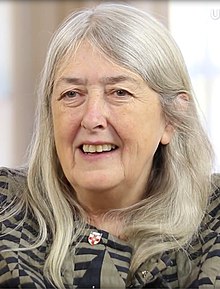Mary Beard (classicist)
Appearance

Winifred Mary Beard (born January 1, 1955 in Much Wenlock, in Shropshire, in England) is an English scholar of Ancient Rome. She is a trustee of the British Museum and formerly held a personal professorship of Classics at the University of Cambridge. She is a fellow of Newnham College, Cambridge, and Royal Academy of Arts Professor of Ancient Literature.
Quotes
[edit]- But when the shock had faded, more hard-headed reaction set in. This wasn’t just the feeling that, however tactfully you dress it up, the United States had it coming. That is, of course, what many people openly or privately think. World bullies, even if their heart is in the right place, will in the end pay the price. But there is also the feeling that all the ‘civilised world’ (a phrase which Western leaders seem able to use without a trace of irony) is paying the price for its glib definitions of ‘terrorism’ and its refusal to listen to what the ‘terrorists’ have to say.
- London Review of Books, 4 October 2001
- Rome was the only place in the ancient world where the state took responsibility for ensuring its citizens had enough to eat. [They knew] how you make a human community work.
- Roman society incorporated those who were mostly excluded in the ancient world, most obviously, women... They didn't have any formal political rights in Rome
- Greece vs Rome, debate with Boris Johnson (19 November 2015)
- Greek men didn't all look like this. And indeed, this guy, his musculature is actually physically impossible. What these are are images of a kind of perfect version of Greek masculinity.
- Shock of the Nude (2020), Episode 1
- She's one of a series of wax models that were used in anatomy classes to demonstrate the internal structure of the body... And the instructor would come along and would remove, in a slightly sadistic way, the breasts and the chest, and the belly to reveal what was inside. And interestingly, there's a uterus with a foetus in - showing us very clearly what the 18th century thought women were for.
- Shock of the Nude (2020), Episode 2
Women & Power: a Manifesto (2017)
[edit]- When I went to my first interview for an academic position, oddly enough in Thatcher's heyday. I bought myself a pair of blue stockings especially for the occasion. Although it was not my usual style, the logic seemed satisfactory: "If you, interviewers, are going to think that I am a real bluestocking, I will show you that I know what you are thinking and that I thought about it first.
- p. 81
- As for the deep cultural structures that legitimize the exclusion of women, it is very likely that these gradual changes will last too long, at least for me. We need to reflect on what power is, what it is for and how it is calibrated, or in other words, if we do not perceive that women are totally within power structures, then what we need to redefine is power, not women.
- p. 82
- It’s a "high-end" power in the traditional sense and linked to the image of the "glass ceiling", which not only places women out of power, but imagines pioneers as successful superwomen who only a few vestiges of male prejudice prevented them from reaching the top.
- p. 83
- It’s not easy to make women fit into a structure that is initially encoded as masculine: what needs to be done is to change the structure.
- p. 86
- Even more to the point, the root cause of the harassment that women have suffered (and the root cause of the earlier silence of so many) surely lies in the structures of power. If so, then the only effective remedy lies in a change to those structures. While fewer than ten percent of the directors of the top Hollywood films are women (that was the case in 2017), men will remain the gate-keepers of success in the film industry, and the effect of women's voices on its sexual culture – however loudly those voices have now been raised – is likely to be limited.
- p. 100
SPQR: A History of Ancient Rome (2017)
[edit]- Rome of antiquity is important. Ignoring the Romans would not be merely a blind eye to the long-ago past, for Rome helps us to this day to delineate our way of making sense of our world and ourselves, from sublime theory to vulgar comedies. After two thousand years, Rome is still the basis for the culture and politics, literatures and the sense of the world and its place in the world.
- p. 15
- The territorial boundaries of the Roman Empire have been established by the political geography of today's Europe and other regions. The main reason London is the capital of Great Britain is that the Romans made it the capital of their province of Britannia — a dangerous place on the other side of the vast ocean surrounding the civilized world. Rome has bequeathed us understandings of freedom and citizenship, as well as imperialist exploitation, along with today's political vocabulary from "senators" to "dictators." He has lent us his sayings - "fear the Greeks, even if they bring gifts" and "play the violin while Rome burns" and even "where there is life, there is hope". And he has evoked laughter, awe and fear to a more or less equal extent.
- p. 15
- This is a dangerous myth if we think we are better historians than our predecessors.
- p. 16
- Roman history is constantly being written around, it has always been done; In a sense, we know more about our ancient Romans than they themselves knew. In other words, Roman history is a work in progress.
- p. 16



